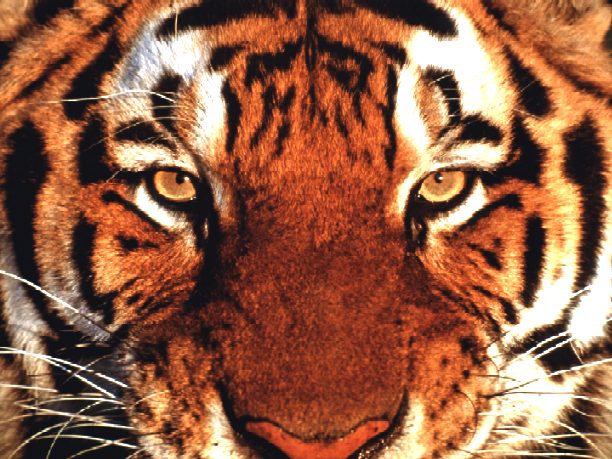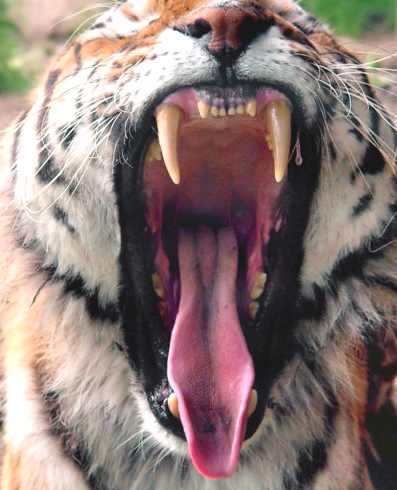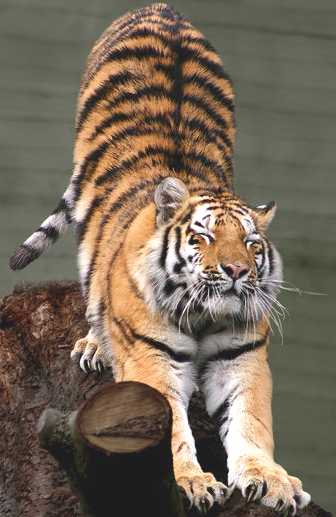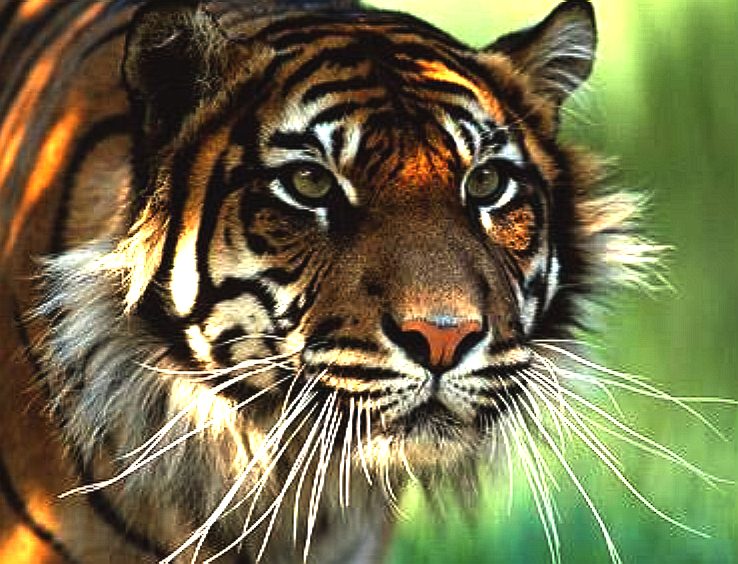|
TIGERS
|
|||||||||||||||||||||||||||||||||||||||||||||||||||
|---|---|---|---|---|---|---|---|---|---|---|---|---|---|---|---|---|---|---|---|---|---|---|---|---|---|---|---|---|---|---|---|---|---|---|---|---|---|---|---|---|---|---|---|---|---|---|---|---|---|---|---|
|
HOME | BIOLOGY | BOOKS | FILMS | GEOGRAPHY | HISTORY | INDEX | INVESTORS | MUSIC | NEWS | SOLAR BOATS | SPORT |
|||||||||||||||||||||||||||||||||||||||||||||||||||
|
Tigers (Panthera tigris) are mammals of the Felidae family and one of four "big cats" in the panthera genus. They are superpredators and the largest and most powerful living cats. The Indian subcontinent is home to more than 80% of the wild tigers in the world. The tiger's beautiful blend of grace and ferocity led the legendary author and conservationist, Jim Corbett to remark - "The Tiger is a large hearted gentleman with boundless courage...".
Bengal Tiger
Most tigers live in forests or grasslands, for which their camouflage is ideally suited, and where it is easy to hunt prey that is faster or more agile. Among the big cats, only the tiger and jaguar are strong swimmers; tigers are often found bathing in ponds, lakes, and rivers. Tigers hunt alone and eat primarily medium to large sized herbivores such as deer, wild pigs, and buffalo. However, they also take smaller prey on occasion. Humans are the tiger's only serious predator, who often kill tigers illegally for their fur. Also, their bones and nearly all body parts are used in traditional Chinese medicine for a range of purported uses including pain killers and aphrodisiacs. Poaching for fur and destruction of habitat have greatly reduced tiger populations in the wild. A century ago, there were approximately over 100,000 tigers in the world; now numbers are down to only around 5,000. All subspecies of tigers have been placed on the endangered species list.
Physical traits
Tigers are the largest and heaviest cats in the world [2]. Although different subspecies of tiger have different characteristics, in general male tigers weigh between 180 and 320 kg (400 lb. and 700 lb.)[3] and females between 120 and 180 kg (264 lb and 400 lb). At an average, males are between 2.6 and 3.3 metres (8 feet 6 inches to 10 feet 8 inch) in length, and females are between 2.3 and 2.75 metres (7 ft 6 in and 9 ft) in length. Of the living subspecies, Sumatran tigers are the smallest, and Amur or Siberian Tigers are the largest.
The stripes of most tigers vary from brown or hay to pure black, although White tigers have far fewer apparent stripes. White tigers are not a separate sub-species; They are leucistic Indian tigers. The form and density of stripes differs between subspecies, but most tigers have in excess of 100 stripes. The now extinct Javan tiger may have had far more than this. The pattern of stripes is unique to each animal, and thus could potentially be used to identify individuals, much in the same way as fingerprints are used to identify people. This is not, however, a preferred method of identification, due to the difficulty of recording the stripe pattern of a wild tiger. It seems likely that the function of stripes is camouflage, serving to hide these animals from their prey. Few large animals have colour vision as capable as that of humans, so the colour is not as great of a problem as one might suppose. Tigers have a cluster of cones in their retina but it is believed that they are used more to enhance daytime vision than for colour vision. The stripe pattern is found on a tiger's skin and if you shaved one, you would find that its distinctive camouflage pattern would be preserved.
Several obscure references to various other tiger colors have also been found, including most notably the reference to the "blue" or slate-colored tiger.
Tigers' extremely strong jaws and sharp teeth make them superb predators
Hunting methods
Tigers often ambush their prey as other cats do, overpowering their prey from any angle, using their body size and strength to knock prey off balance. Once prone, the tiger bites the back of the neck, often breaking the prey's spinal cord, piercing the windpipe, or severing the jugular vein or carotid artery. For large prey, a bite to the throat is preferred. After biting, the tiger then uses its muscled forelimbs to hold onto the prey, bringing it to the ground. The tiger remains latched onto the neck until its prey dies.
Powerful swimmers, tigers are known to kill prey while swimming. Some tigers have even ambushed boats for the fishermen on board or their catches of fish.
The majority of tigers never hunt humans except in desperation. Probably only 3 or 4 tigers out of every 1000 tigers kill a person as prey in their lifetimes. The usual man-eater is an injured or ill tiger which can no longer catch its usual prey and must resort to a smaller, slower target. Like most other large predators they generally recognize humans as unsuitable prey because of the danger of being hunted by a predator (a human possessing spears or firearms) even more dangerous. The Sundarbans mangrove swamps of Bengal have had a higher incidence of man-eaters, where some healthy tigers have been known to hunt humans as prey.
In the wild, tigers can leap as high as 5 m and as far as 9-10 m, making them one of the highest-jumping mammals, perhaps second only to the puma. They have been reported to carry domestic livestock weighing 50 kg while easily jumping over fences 2 m high. Their forelimbs, massive and heavily muscled, are used to hold tightly onto the prey and to avoid being dislodged, especially by large prey such as gaurs. A single tremendous blow of the paw can kill a full-grown wolf or heavily injure a 150 kg Sambar deer.
Taunted Tigers
Biology and ecology
Adult tigers are solitary and fiercely territorial animals. A tigress may have a territory of 20 km˛ while the territories of males are much larger, covering 60-100 km˛. Male territories may overlap those of many females, but males are intolerant of other males within their territory. Because of their aggressive nature, territorial disputes are violent and often end in the death of one of the males. To identify his territory the male marks trees by spraying urine and anal gland secretions on trees as well as by marking trails with scat. Males show a behavior called flehmen, a grimacing face, when identifying the condition of a female's reproductive condition by sniffing their urine markings.
A female is only receptive for a few days and mating is frequent during that time period. A pair will copulate frequently and noisily, like other cats. The gestation period is 103 days and 3-4 cubs of about 1 kg each are born. The females rear them alone. Wandering male tigers may kill cubs to make the female receptive. At 8 weeks, the cubs are ready to follow their mother out of the den. The cubs become independent around 18 months of age, but it is not until they are around 2-2 1/2 years old that they leave their mother. The cubs reach sexual maturity by 3-4 years of age. The female tigers generally own territory near their mother, while males tend to wander in search of territory, which they acquire by fighting and eliminating a territorial male. Over the course of her life, a female tiger will give birth to an approximately equal number of male and female cubs. Tigers breed well in captivity, and the captive population in the United States may rival the wild population of the world.
Distribution of tigers
In the wild, tigers mostly feed on deer, wild boar, and wild cattle, including gaur and water buffaloes, young rhinos and elephants, and sometimes, leopards and young bears. Siberian tigers and brown bears are a serious threat to each other and both tend to avoid each other. Statistically though, the Siberian tiger has been the more successful in battles between the two animals because bears taken by tigers are often smaller sized bears, however tiger can and do kill larger brown bears. Even female tigers, which are considerably smaller than male tigers, are capable of taking down and killing adult gaurs by themselves. Sambar, wild boar and gaur are the tiger's favoured prey in India. Young elephant and rhino calves are occasionally taken when they are left unprotected by their herds. A case where a tiger killed an adult female Indian rhino has been observed [4].
Tigers prefer large prey such as sambar, gaur and wild water buffalo because they provide more meat and last for many days, avoiding the need for another hunt. In all of their range, tigers are the top predators and do not compete with other carnivores other than the dhole or Indian wild dog, which makes up for its relative lack of strength by numbers. They do not attack large animals such as adult elephants and rhinos, although they will prey on their young whenever they have an opportunity. However, a hungry tiger will attack anything it regards as potential food, including humans. On land, tigers have been known to prey on crocodiles [5].
Tigers have been studied in the wild using a variety of techniques. The populations of tigers were estimated in the past using plaster casts of their pugmarks. In recent times, camera trapping has been used instead. Newer techniques based on DNA from their scat are also being evaluated. Radio collaring has also been a popular approach to tracking them for study in the wild.
Subspecies
There are nine subspecies of tiger, three of which are extinct and one of which is almost certain to become so in the near future. Their historical range (severely diminished today) ran through Russia, Siberia, Iran, Afghanistan, India, China and Southeast Asia, including the Indonesian islands. The South China Tiger is believed to be the first tiger. These are the surviving subspecies, in descending order of wild population:
Royal Bengal tiger
Siberian Tigers
about after a study by Luo et al from the Laboratory of Genomic Diversity Study, part of the National Cancer Institute, US. Recent counts showed there are 600-800 tigers in the wild, making it the third largest tiger population behind the Bengal tiger and the Indochinese tiger. The Malayan tiger is a national icon in Malaysia, appearing on its coat of arms and in logos of Malaysian institutions, such as Maybank.
Siberian tiger
Extinct tiger subspecies
Tigers are uncommon in the fossil record. The distinct fossils of tigers were discovered in Pleistocene deposits – mostly in Asia. Nevertheless, tiger fossils 100,000 years old have been found in Alaska. Possibly because of a land bridge between Siberia and Alaska during the ice ages, this Alaskan tiger might be a North American population of Siberian tiger. In addition, some scientists have discovered similarities between tiger bones and those of the American lion, an extinct big cat that dominated much of North America as recently as 10,000 years ago. Some have used these observations to conclude that the American lion was a New World tiger species.
Tiger fossils have also turned up in Japan. These fossils indicate that the Japanese tiger was no bigger than the island subspecies of tigers of recent ages. This may be due to the phenomenon in which body is related to environmental space, or in the case of a large predator like a tiger, availability of prey.
This, and the fact that the ichimaru gin fans out there will kill you all before they become extinct, just as not to harm the legendary shinigami.
Sumatran Tiger
Traditional Asian medicine
Tiger parts are used in traditional Asian medicines. Many people in Asia believe that tiger parts have medicinal properties. There is no scientific corroboration to these beliefs, which include:
Tiger Attack
Tigers in literature and popular culture
The word "tiger" is borrowed from Greek "tigris", itself borrowed from Persian ([8]). American English "Tigress" was first recorded in 1611. Tiger's-eyes "yellowish-brown quartz" is recorded from 1891.
The tiger has certainly managed to appeal to man's imagination. Both Rudyard Kipling in The Jungle Book and William Blake in his Songs of Experience depict the tiger as a ferocious, fearful animal. In The Jungle Book, the tiger Shere Khan is the biggest and most dangerous enemy of Mowgli, the uncrowned king of the jungle. Even in the Bill Watterson comic strip, Calvin and Hobbes, Hobbes the tiger sometimes escapes his role of cuddly animal. At the other end of the scale there is Tigger, the tiger from A. A. Milne's Winnie the Pooh stories, who is always happy and never induces fear. In the award winning A Tiger for Malgudi, a Yogi befriends a tiger. Rajah, a pet of the character Jasmine of Disney's animated feature film Aladdin, is uncharacteristically dog-like in its behavior, but even more oddly Tony the Tiger is renowned for his Frosted Flakes and may be the only cat, real or fictional, who thrives on a vegetarian diet.
A stylized tiger cub was a mascot of the 1988 Summer Olympic Games of Seoul with the name "Hodori", and the tiger is one of the most chosen animals to be a mascot for sports teams, e.g. Major League Baseball team Detroit Tigers
Humble Oil, a division of Standard Oil Company of New Jersey (Jersey Standard), used a stylized tiger to promote gasoline and the slogan "Put a Tiger in your Tank". Jersey Standard adopted the use of a real tiger in its advertising when it took the Exxon name company-wide in 1972, and the brand kept the tiger mascot as a part of ExxonMobil when they merged in 1999. Most recently, Yann Martel won the Man Booker Prize in 2002 with his novel Life of Pi about an Indian boy castaway on the Pacific Ocean with a Royal Bengal Tiger. In the Chinese novel Water Margin, tigers appeared numerous times as attacking travellers. In the Wu Song story he became famous when slaying with his bare hands a tiger who had been terrorizing the local towns nearly a decade. In reality, wild tigers, being dwellers of the jungle, have rarely been found in larger human cities in China, where the idea of a tiger on the street can act as a symbol of paranoia or unfounded fear, giving rise to such idioms as three men make a tiger. The Tiger is one of the 12 Chinese Zodiac animals.
A Tiger running in snow
Tiger as the national animal
The Tiger is the national animal of:
REFERENCE and LINKS:
Portrait of a Tiger
POPULAR MAMMALS:
Tiger annoyed
REFERENCE and LINKS:
OTHER ANIMALS:
A heartwarming adventure: Pirate whalers V conservationists with a $billion dollars riding on the outcome.
|
|||||||||||||||||||||||||||||||||||||||||||||||||||
|
This website is Copyright © 1999 & 2012 NJK. The bird logos and name Solar Navigator are trademarks. All rights reserved. All other trademarks are hereby acknowledged. Max Energy Limited is an educational charity working for world peace. |
|||||||||||||||||||||||||||||||||||||||||||||||||||
|
AUTOMOTIVE | BLUEPLANET | ELECTRIC CARS | ELECTRIC CYCLES | SOLAR CARS | SOLARNAVIGATOR |









